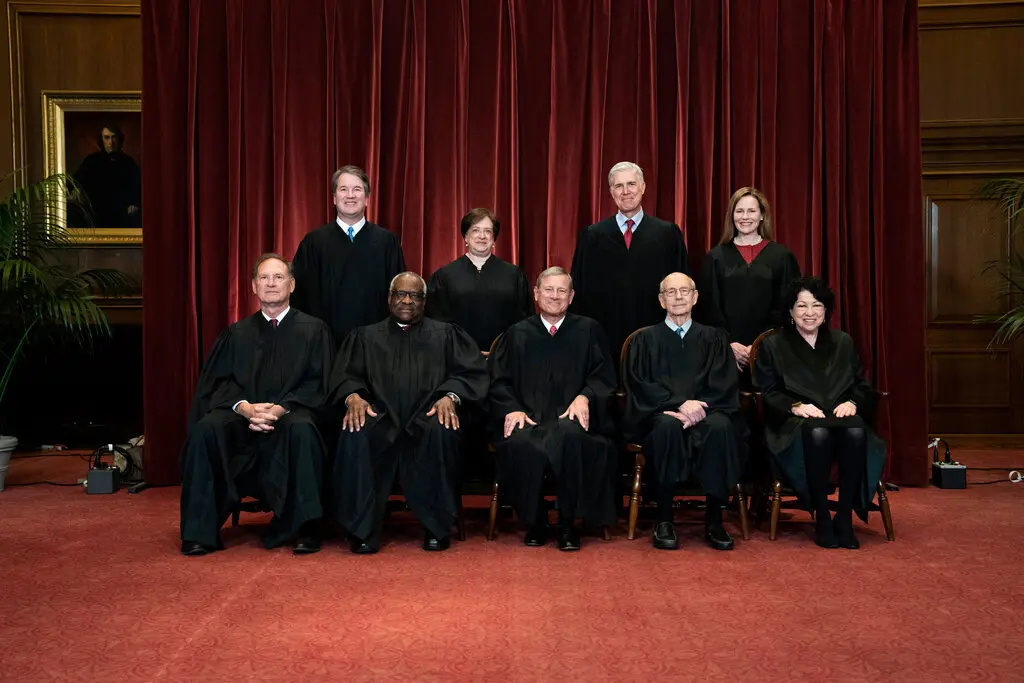The SCOTUS is not apolitical.
06 May 2022

Justice Samuel A. Alito Jr., far left, and Chief Justice John G. Roberts Jr., center, with the rest of the Supreme Court justices last year. The two men appear to have differing views on the future of Roe v. Wade.
Chief Justice Roberts appears to be a bit hot under the collar. To hear him and others tell it, Tuesday’s leak of a draft majoritarian decision from the Court violates a sacrosanct process. The leak indicates that the SCOTUS will likely overturn Roe v. Wade. It is a fifty-year, watershed decision that ensured American women could access certain reproductive health services, including abortion. The decision allowed access to abortion services, but it ensured American women and their providers would not face punitive action from the state. In addition to previous statements, Robert’s response appears to highlight a belief in a system that is apolitical.
To the extent this betrayal of the confidences of the Court was intended to undermine the integrity of our operations, it will not succeed. The work of the Court will not be affected in any way.
But why do Americans (white Americans, I should clarify) believe their justice system (specifically, the SCOTUS) is an apolitical institution? And why do mainstream journalists perpetuate that bit of cultural fantasy? I have lived here for nearly 15 years, and a constant refrain in discussing the SCOTUS is how it is composed of a distinguished body of legal scholars. Scholars whose high-minded discourse ensures that other branches of government remain beholden to the law.
It is a flawed view. I mean, these justices may be learned scholars, but their activities are not abstract exercises. Their decisions in the past have literally meant death and suffering for many. And the persistence of this cultural fantasy is part of the reason we are here today, with Roe on the cusp of being discarded and women losing access to safe and effective abortions.
You have one segment of the hoi polloi believing that the Court and its servants earnestly wish to uphold the law. Furthermore, they can set aside bias while peering at the law and can make decisions that, over time, benefit people and improve lives. Simultaneously, there is a more cynical element, an element that is perhaps more politically savvy and aware of the deep biases of the Court and its servants. And this cynical element, also floating among the masses, is more than happy to exploit those biases.
A cursory glance at the system clearly shows this. The justices are political appointees hand-selected by the political leadership, hoping they will espouse legal opinions that will move polling in the correct direction. There is that bit of political theater; the confirmation process. The nominated candidate is peppered with questions, sometimes serious but often inane. Occasionally, there is a violation of norms where one party will hold up the process or refuse to engage with a candidate. This is what we saw with Merrick Garland several years ago. But even such stunts also point to a bias and a desire for the Court to espouse a particular perspective. In the end, we get justices who we can reliably count on to vote a specific way. Oh, there will be instances where they don’t behave according to expected predictions; still, those are rare (e.g., Justice Roberts siding with the “liberal” justices when deciding Obamacare).
Of course, the justices dress up their opinions with history and convoluted legalese. Still, when the rubber meets the road, their yay or nay in favor of an outcome is all that matters. Even what they write is not particularly important as there is always some argument lying around that may be roped into the Court’s opinion some legitimacy. Why else would Justice Alito reference the works of a long-dead legal mind, Matthew Hale, whose perspectives led to spousal rape exceptions?
Then there are the wealthy elements in society who have seized on the nomination process to foist their views on society. The Federalist Society is perhaps the best example, leveraging a multimillion-dollar annual budget as a cudgel to push only the right legal minds into the court system.
For the system and its advocates to continue insisting that they are apolitical is a clear case of the adage “you’re urinating on my leg while telling me it is raining”. I can understand the need for secrecy and the need to operate in a vacuum-like state that excludes public pressure. However, justices come to the position with deep biases, and elected officials count on those deep biases to advance their positions. Reading Alito’s arguments in the leaked document is a clear example of those deep biases. Good god, I mean, how can you, in good faith, argue that a law that has been in place for fifty-something years lacks the necessary history and traditional context and, therefore, must be overturned. That is at least two generations of adults who have come up during the time. When that law was passed, half the African continent was still under European rule, and the US was still slaughtering people in Vietnam. To argue that it lacks historical and traditional support is asinine.
Header Image Information: The Roberts Court (Seated from left to right: Justices Samuel A. Alito, Jr. and Clarence Thomas, Chief Justice John G. Roberts, Jr., and Justices Stephen G. Breyer and Sonia Sotomayor/ Standing from left to right: Justices Brett M. Kavanaugh, Elena Kagan, Neil M. Gorsuch, and Amy Coney Barrett.) Photograph by Fred Schilling, Collection of the Supreme Court of the United States (https://flic.kr/p/2nyXkGm)
Title Image source: Erin Schaff/The New York Times